Reading
At St Nicholas Priory, the Reading curriculum underpins every facet of our children’s learning journeys. Our vision is to equip every child with the essential skills needed to read critically, analyse and make connections. Children are rigorously taught the fundamentals of segmenting and blending and through this, evolve their reading fluency and speed. We teach through a wide range of inspirational texts, which encourage imagination, fascination and contextual understanding. These are chosen on the basis of supplying cross-cultural experiences and are relevant to both their current and future lives. From the Foundation stage, our early readers are coached to foster a love of reading which is nurtured through their time at Priory into Key Stage 2 and beyond. We want our readers to know the toolbox of reading skills they have at their disposal to apply across all subject areas.
Developing a love of readi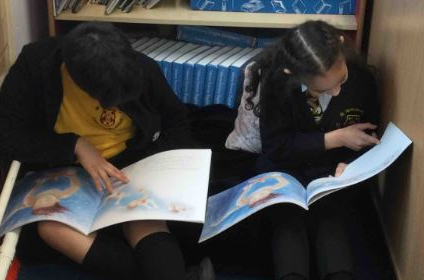 ng, independent reading and the structure of reading lessons is a priority within our school development plan. School leaders and governors recognise that reading is an essential skill embed vocabulary, comprehension and increases cultural capital. We have invested a lot of time in training our teaching adults to be reading experts, ensuring that the monitoring of reading is thorough and robust.
ng, independent reading and the structure of reading lessons is a priority within our school development plan. School leaders and governors recognise that reading is an essential skill embed vocabulary, comprehension and increases cultural capital. We have invested a lot of time in training our teaching adults to be reading experts, ensuring that the monitoring of reading is thorough and robust.
The systematic, synthetic phonics programme of Read, Write Inc is delivered daily across EYFS and KS1. Some children in KS2 are taught phonics by trained Read, Write Inc teachers.
KS2 children spend 15 minutes a day accessing their Accelerated Reading books as well as having the opportunity to take tests.
In EYFS, we host stalls at parents’ evenings, teaching parents how to teach their child the phonics sounds at home.
Staff and children are passionate about reading and we are trying to weave a love of reading into daily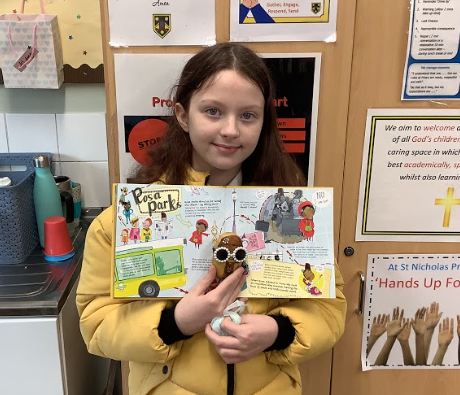 school life. Teaching adults read to each class every day using a high quality class novel. We have opened up the library at break time and lunchtimes to encourage children to spend their free time reading their favourite books. In the library, Reading Ambassadors have been chosen from different year groups, these children organise the library.
school life. Teaching adults read to each class every day using a high quality class novel. We have opened up the library at break time and lunchtimes to encourage children to spend their free time reading their favourite books. In the library, Reading Ambassadors have been chosen from different year groups, these children organise the library.
Here are some of the ways we encourage a love of reading in school:
Read, Write Inc is a phonics programme that we use at St Nicholas Priory. 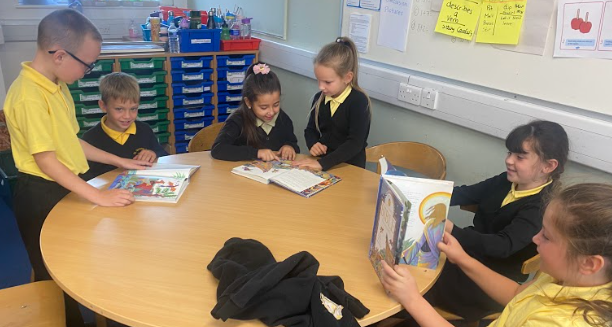 The children learn 3 sets of sounds that increase in difficulty throughout the sets.These sounds are then blended and segmented. Phonics lessons are taught in very small ability groups and are reassessed every 3 weeks. Children’s home reading books are, at first, levelled by their phonetic reading abilities using the RWI books and as they grow in confidence they move on to Oxford Reading Tree comprehension books. As they progress through the school, the children’s book level is based on their Accelerated Reader tests.
The children learn 3 sets of sounds that increase in difficulty throughout the sets.These sounds are then blended and segmented. Phonics lessons are taught in very small ability groups and are reassessed every 3 weeks. Children’s home reading books are, at first, levelled by their phonetic reading abilities using the RWI books and as they grow in confidence they move on to Oxford Reading Tree comprehension books. As they progress through the school, the children’s book level is based on their Accelerated Reader tests.
We use point in time assessment in reading lessons to keep a close eye on children’s progress day by day. Every half term one of the Reading coordinators monitors the progress of reading across the whole school and monitors any children who may need extra intervention. These children will then have extra targeted reading time to catch them up.
Our children begin phonics lessons from their first week at school. Their skills are built up over 5 (EYFS) and 4 (KS1) lessons a week. There are 8 reception ability RWI groups and there are 10 ability reading groups taught across KS1, meaning that children that need extra phonics can have specialised targeted lessons and children that are fluent and can access comprehension can accelerate their reading skills. In KS1 spelling tests are conducted every week and these spellings relate to sounds taught in Read, Write Inc.
In the National Curriculum, it states ‘If children, by the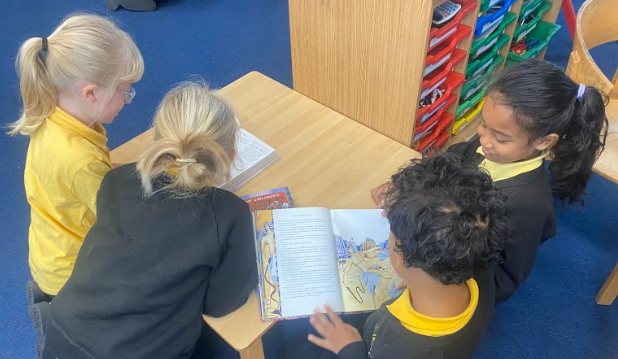 end of year 1, are still struggling to decode and spell they need to be taught to do this urgently through a rigorous and systematic phonics programme so they can catch up rapidly.’
end of year 1, are still struggling to decode and spell they need to be taught to do this urgently through a rigorous and systematic phonics programme so they can catch up rapidly.’
Children who do not pass the phonics screening test in Year 1 will have another full year of targeted phonics teaching. We have seen a huge improvement in 2nd time passers since teaching reading as a KS1 phase.
Those children that do not pass the phonics screening test in Year 2 get taught reading in ‘The Den’, which is a specialised class for the lowest 20% in KS2.
In Year 4 we have 12 children that have received vigorous training in phonics, led by the Headteacher.
Each Reading Teacher teaches phonics to a child, 1-1, in Reception every lunch time.
The Reading Teachers have their own resources, create their own lesson plans and assess the children they are teaching. This has had a significant impact on the children being taught and we are seeing the improvements in phonics as the children come into Year 1.
Children who have been identified as not reading often at home become [art of our ‘Home from Home’ reading scheme. This where staff members are assigned a child and for the first 15 minutes of each day, they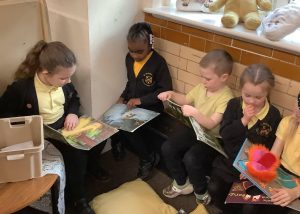 read with their child. This has dramatically improved fluency, expression and speed.
read with their child. This has dramatically improved fluency, expression and speed.
School Partnerships: Sheringham Teaching School, GY7 cluster of schools.
If you would like a paper copy (free of charge) of any of the information on our school’s website please contact the school office.
Parent View gives you the chance to tell Ofsted what you think about your child’s school, from the quality of teaching to dealing with bullying and poor behaviour. To make any comments about our school please click here.